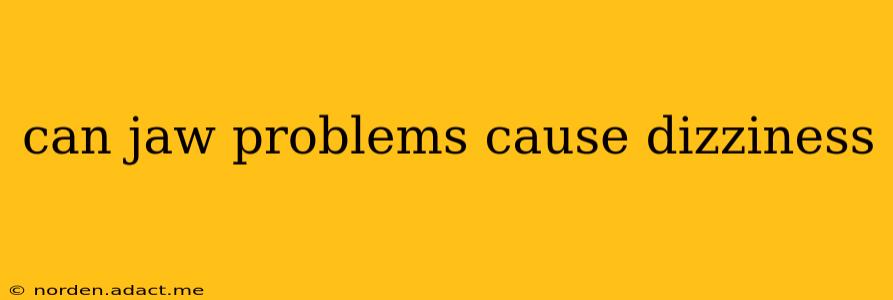Can Jaw Problems Cause Dizziness? Exploring the TMJ-Dizziness Connection
Dizziness is a frustrating and often debilitating symptom, and its causes can be surprisingly varied. While many think of inner ear issues as the primary culprit, jaw problems, specifically temporomandibular joint (TMJ) disorders, can also contribute to dizziness. This article explores the connection between jaw problems and dizziness, answering common questions and providing valuable insights into this often-overlooked relationship.
What is TMJ Disorder?
Temporomandibular joint (TMJ) disorder refers to a group of conditions affecting the jaw joint and the muscles controlling jaw movement. The TMJ is the hinge connecting your lower jaw to your skull, allowing you to open and close your mouth, chew, and speak. TMJ disorders can result from a variety of factors, including injury, arthritis, grinding teeth (bruxism), stress, and even misalignment of the jaw. Symptoms range from mild discomfort to severe pain, and can include:
- Jaw pain: Pain in the jaw, temples, or face.
- Headaches: Often migraines or tension headaches.
- Earaches: Pain or ringing in the ears (tinnitus).
- Neck pain: Stiffness or pain in the neck and shoulders.
- Clicking or popping sounds in the jaw: Noises when opening or closing the mouth.
- Limited jaw movement: Difficulty opening or closing the mouth fully.
How Can TMJ Problems Lead to Dizziness?
The connection between TMJ disorders and dizziness isn't always straightforward, but several mechanisms are suspected:
-
Cranial Nerve Involvement: The trigeminal nerve, which controls sensation in the face and jaw, is closely related to cranial nerves involved in balance and coordination. TMJ dysfunction can irritate or compress these nerves, disrupting the signals responsible for maintaining equilibrium.
-
Muscle Tension: Chronic muscle tension in the jaw, neck, and shoulders, common in TMJ disorders, can lead to tension headaches and, subsequently, dizziness. This is because the muscles in this area are closely linked to the vestibular system, which is crucial for balance.
-
Postural Changes: TMJ problems can sometimes cause postural changes, impacting the alignment of the head and neck. These shifts can affect the vestibular system and contribute to dizziness or vertigo.
-
Vertebral Artery Compression: In rare cases, severe TMJ problems can lead to compression of the vertebral arteries, which supply blood to the brain. Reduced blood flow can cause dizziness, visual disturbances, and even neurological symptoms.
H2: Can TMJ Cause Vertigo?
Yes, TMJ disorders can contribute to vertigo, which is a sensation of spinning or whirling. The same mechanisms mentioned above—nerve irritation, muscle tension, and postural changes—can all play a role in triggering vertigo in individuals with TMJ problems. If you experience vertigo alongside jaw pain, it's crucial to seek professional medical attention.
H2: What are the Symptoms of TMJ-Related Dizziness?
Symptoms of dizziness related to TMJ disorders may include:
- Lightheadedness: A feeling of faintness or unsteadiness.
- Vertigo: A sensation of spinning or whirling.
- Imbalance: Difficulty maintaining balance and coordination.
- Nausea: Feeling sick to the stomach.
- Headaches: Often accompanied by jaw pain.
- Ear symptoms: Ringing in the ears or muffled hearing.
H2: How is TMJ-Related Dizziness Diagnosed?
Diagnosing TMJ-related dizziness requires a comprehensive evaluation by a healthcare professional. This typically involves:
- Physical examination: To assess jaw range of motion, muscle tension, and palpate for tenderness.
- Imaging studies: X-rays, CT scans, or MRIs may be used to visualize the TMJ and surrounding structures.
- Neurological examination: To rule out other neurological conditions that can cause dizziness.
H2: How is TMJ-Related Dizziness Treated?
Treatment for TMJ-related dizziness focuses on addressing the underlying TMJ disorder. Options may include:
- Pain management: Over-the-counter pain relievers, muscle relaxants, or other medications.
- Physical therapy: Exercises to improve jaw mobility and reduce muscle tension.
- Splints or mouthguards: To reduce teeth grinding and protect the jaw joint.
- Lifestyle modifications: Stress management techniques, improved posture, and dietary changes.
- Surgery: In severe cases, surgery may be considered.
Important Note: This information is for general knowledge and does not constitute medical advice. If you experience dizziness or jaw pain, it is crucial to consult with a healthcare professional for proper diagnosis and treatment. They can accurately determine the cause of your symptoms and recommend the most appropriate course of action.
